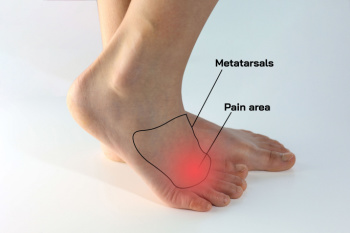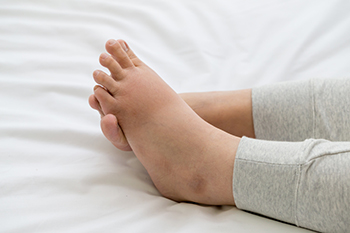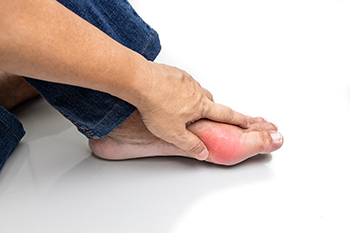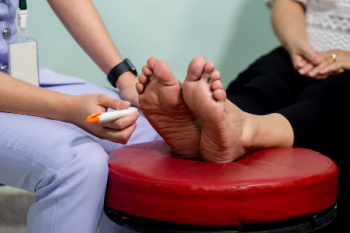283 St Rose Ave
Windsor, ON N8S 1X1
February 2024
Morton’s Neuroma and Flat Feet

Morton's neuroma is characterized by nerve inflammation or thickening between the metatarsal bones. This condition poses significant discomfort, made worse by wearing ill-fitting shoes or high heels. People with flat feet face an elevated risk of developing Morton’s neuroma because of altered foot mechanics that increase pressure on the nerves. Symptoms of Morton's neuroma include sharp pain between toes and a burning sensation while walking or standing. Numbness, tingling, and inflammation also may be experienced. Diagnostic tools to determine the severity of Morton’s neuroma include musculoskeletal ultrasound, X-rays, and MRIs. Treatment may encompass modifying activity, taking anti-inflammatory medications, and adjusting footwear. A podiatrist may prescribe corticosteroid injections and suggest custom orthotics for additional relief. In some cases, minimally invasive surgical options to remove the neuroma may be necessary. If you are experiencing the above symptoms in the ball of the foot, it is suggested that you make an appointment with a podiatrist for an exam, diagnosis, and treatment options.
Morton’s neuroma is a very uncomfortable condition to live with. If you think you have Morton’s neuroma, contact the practitioners of Foot Care Institute. Our practitioners will attend to all of your foot care needs and answer any of your related questions.
Morton’s Neuroma
Morton's neuroma is a painful foot condition that commonly affects the areas between the second and third or third and fourth toe, although other areas of the foot are also susceptible. Morton’s neuroma is caused by an inflamed nerve in the foot that is being squeezed and aggravated by surrounding bones.
What Increases the Chances of Having Morton’s Neuroma?
- Ill-fitting high heels or shoes that add pressure to the toe or foot
- Jogging, running or any sport that involves constant impact to the foot
- Flat feet, bunions, and any other foot deformities
Morton’s neuroma is a very treatable condition. Orthotics and shoe inserts can often be used to alleviate the pain on the forefront of the feet. In more severe cases, corticosteroids can also be prescribed. In order to figure out the best treatment for your neuroma, it’s recommended to seek the care of a podiatrist who can diagnose your condition and provide different treatment options.
If you have any questions, please feel free to contact our office located in Windsor, ON . We offer the newest diagnostic and treatment technologies for all your foot care needs.
Why Does Foot Swelling Occur During Pregnancy?

Foot swelling, or edema, is a common occurrence during pregnancy and can be attributed to various factors. As the body produces more blood and bodily fluids to support the developing fetus, the circulatory system experiences increased pressure, leading to fluid retention in the feet and ankles. Hormonal changes, specifically elevated levels of progesterone, contribute to the relaxation of blood vessels, causing them to dilate and allowing fluid to accumulate in the lower extremities. Additionally, the growing uterus puts pressure on the veins that return blood from the legs to the heart, further impeding circulation and exacerbating swelling. Prolonged standing or sitting, high ambient temperatures, and dietary factors like excessive salt intake can also exacerbate foot swelling at this time. If you are seeking relief options for your swollen feet during pregnancy, it is suggested that you consult a podiatrist who can offer you effective relief techniques.
Pregnant women with swollen feet can be treated with a variety of different methods that are readily available. For more information about other cures for swollen feet during pregnancy, consult with the practitioners from Foot Care Institute. Our practitioners will attend to all of your foot and ankle needs.
What Foot Problems Can Arise During Pregnancy?
One problem that can occur is overpronation, which occurs when the arch of the foot flattens and tends to roll inward. This can cause pain and discomfort in your heels while you’re walking or even just standing up, trying to support your baby.
Another problem is edema, or swelling in the extremities. This often affects the feet during pregnancy but tends to occur in the later stages.
How Can I Keep My Feet Healthy During Pregnancy?
- Wearing orthotics can provide extra support for the feet and help distribute weight evenly
- Minimize the amount of time spent walking barefoot
- Wear shoes with good arch support
- Wear shoes that allow for good circulation to the feet
- Elevate feet if you experience swelling
- Massage your feet
- Get regular, light exercise, such as walking, to promote blood circulation to the feet
If you have any questions please feel free to contact our office located in Windsor, ON . We offer the newest diagnostic and treatment technologies for all your foot and ankle needs.
Preventing Long-Term Joint Damage From Gout
 Besides the immediate discomfort of gout attacks, continuous and untreated gout attacks leave potential for joint damage. Gout is caused by elevated levels of uric acid in the body. The acid crystallizes and builds up in the joints, leading to painful episodes called gout attacks that often start in the big toe. Recurrent gout attacks can contribute to joint damage and deterioration over time. The repeated inflammatory responses within the joints can erode cartilage, the protective tissue that cushions the joints, and can cause irreversible damage. Untreated gout can also lead to the formation of tophi, lumps of uric acid crystals that accumulate in and around the joints. While usually painless, tophi can cause damage to the bone, pop up above the skin, and become infected. If you have gout or big toe pain, it is suggested you seek the help of a podiatrist who can develop a treatment plan that prevents long-term joint damage and preserves your joint health.
Besides the immediate discomfort of gout attacks, continuous and untreated gout attacks leave potential for joint damage. Gout is caused by elevated levels of uric acid in the body. The acid crystallizes and builds up in the joints, leading to painful episodes called gout attacks that often start in the big toe. Recurrent gout attacks can contribute to joint damage and deterioration over time. The repeated inflammatory responses within the joints can erode cartilage, the protective tissue that cushions the joints, and can cause irreversible damage. Untreated gout can also lead to the formation of tophi, lumps of uric acid crystals that accumulate in and around the joints. While usually painless, tophi can cause damage to the bone, pop up above the skin, and become infected. If you have gout or big toe pain, it is suggested you seek the help of a podiatrist who can develop a treatment plan that prevents long-term joint damage and preserves your joint health.
Gout is a foot condition that requires certain treatment and care. If you are seeking treatment, contact the practitioners from Foot Care Institute. Our practitioners will treat your foot and ankle needs.
What Is Gout?
Gout is a type of arthritis caused by a buildup of uric acid in the bloodstream. It often develops in the foot, especially the big toe area, although it can manifest in other parts of the body as well. Gout can make walking and standing very painful and is especially common in diabetics and the obese.
People typically get gout because of a poor diet. Genetic predisposition is also a factor. The children of parents who have had gout frequently have a chance of developing it themselves.
Gout can easily be identified by redness and inflammation of the big toe and the surrounding areas of the foot. Other symptoms include extreme fatigue, joint pain, and running high fevers. Sometimes corticosteroid drugs can be prescribed to treat gout, but the best way to combat this disease is to get more exercise and eat a better diet.
If you have any questions please feel free to contact our office located in Windsor, ON . We offer the newest diagnostic and treatment technologies for all your foot and ankle needs.
Facts About Peripheral Neuropathy

Peripheral neuropathy, commonly associated with diabetes, is nerve damage that primarily affects the extremities, especially the feet and legs. Symptoms of peripheral neuropathy include burning, tingling, numbness, pain, and weakness. These often worsen at night and lead to balance issues and difficulty walking. Peripheral neuropathy can increase the risk of foot problems, such as blisters and sores, that go unnoticed. This can result in severe infections, ulcers, or even loss of limb if left untreated. Diagnosis by a podiatrist involves medical history, physical examination, and tests like neurological exams and foot sensation assessments. Prevention entails meticulous diabetes management, regular foot care, and prompt treatment of any foot issues. Collaboration with healthcare professionals, especially a podiatrist, is vital for effective management of peripheral neuropathy. In order to improve and preserve foot health, it is suggested that you are under the care of a podiatrist who is medically trained to treat this condition.
Neuropathy
Neuropathy can be a potentially serious condition, especially if it is left undiagnosed. If you have any concerns that you may be experiencing nerve loss in your feet, consult with the practitioners from Foot Care Institute. Our practitioners will assess your condition and provide you with quality foot and ankle treatment for neuropathy.
What Is Neuropathy?
Neuropathy is a condition that leads to damage to the nerves in the body. Peripheral neuropathy, or neuropathy that affects your peripheral nervous system, usually occurs in the feet. Neuropathy can be triggered by a number of different causes. Such causes include diabetes, infections, cancers, disorders, and toxic substances.
Symptoms of Neuropathy Include:
- Numbness
- Sensation loss
- Prickling and tingling sensations
- Throbbing, freezing, burning pains
- Muscle weakness
Those with diabetes are at serious risk due to being unable to feel an ulcer on their feet. Diabetics usually also suffer from poor blood circulation. This can lead to the wound not healing, infections occurring, and the limb may have to be amputated.
Treatment
To treat neuropathy in the foot, podiatrists will first diagnose the cause of the neuropathy. Figuring out the underlying cause of the neuropathy will allow the podiatrist to prescribe the best treatment, whether it be caused by diabetes, toxic substance exposure, infection, etc. If the nerve has not died, then it’s possible that sensation may be able to return to the foot.
Pain medication may be issued for pain. Electrical nerve stimulation can be used to stimulate nerves. If the neuropathy is caused from pressure on the nerves, then surgery may be necessary.
If you have any questions, please feel free to contact our office located in Windsor, ON . We offer the newest diagnostic and treatment technologies for all your foot care needs.









